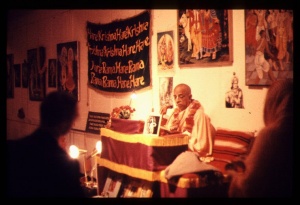SB 4.22.3

A.C. Bhaktivedanta Swami Prabhupada
TEXT 3
- tad-darśanodgatān prāṇān
- pratyāditsur ivotthitaḥ
- sa-sadasyānugo vainya
- indriyeśo guṇān iva
SYNONYMS
tat—him; darśana—seeing; udgatān—being greatly desired; prāṇān—life; pratyāditsuḥ—peacefully going; iva—like; utthitaḥ—got up; sa—with; sadasya—associates or followers; anugaḥ—officers; vainyaḥ—King Pṛthu; indriya-īśaḥ—a living entity; guṇān iva—as influenced by the modes of material nature.
TRANSLATION
Seeing the four Kumāras, Pṛthu Mahārāja was greatly anxious to receive them. Therefore the King, with all his officers, very hastily got up, as anxiously as a conditioned soul whose senses are immediately attracted by the modes of material nature.
PURPORT
In Bhagavad-gītā (BG 3.27) it is said:
- prakṛteḥ kriyamāṇāni
- guṇaiḥ karmāṇi sarvaśaḥ
- ahaṅkāra-vimūḍhātmā
- kartāham iti manyate
Every conditioned soul is influenced by a particular mixture of the modes of material nature. As such, the conditioned soul is attracted to certain types of activity which he is forced to perform because he is completely under the influence of material nature. Here Pṛthu Mahārāja is compared to such a conditioned soul, not because he was a conditioned soul but because he was so anxious to receive the Kumāras that it was as if without them he would have lost his life. The conditioned soul is attracted by the objects of sense gratification. His eyes are attracted to see beautiful things, his ears are attracted to hear nice music, his nose is attracted to enjoy the aroma of a nice flower, and his tongue is attracted to taste nice food. Similarly, all his other senses—his hands, his legs, his belly, his genitals, his mind, etc.—are so susceptible to the attraction of the objects of enjoyment that he cannot restrain himself. Pṛthu Mahārāja, in the same way, could not restrain himself from receiving the four Kumāras, who were bright by dint of their spiritual progress, and thus not only he himself but also his officers and associates all received the four Kumāras. It is said, "Birds of a feather flock together." In this world, everyone is attracted by a person of the same category. A drunkard is attracted to persons who are also drunkards. Similarly, a saintly person is attracted by other saintly persons. Pṛthu Mahārāja was in the topmost position of spiritual advancement, and as such, he was attracted by the Kumāras, who were of the same category. It is said, therefore, that a man is known by his company.